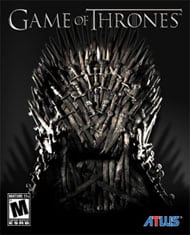The Winter Of The Bad Licensed Game
George R. R. Martin’s Game of Thrones IP (or, more precisely, the Song of Fire and Ice IP for those of us who started with the book series) is really hot right now. Aside from the books themselves, there is an absurdly popular HBO series, a very highly rated board game, and now a console RPG. Like most Game of Thrones products, this RPG plunges the gamer into a world of fantasy and intrigue, putting him or her smack dab in the middle of a story of warring nobility in times of great strife. Unfortunately, this is also a world of glitches, graphical errors, dry dialogue, and general lack of polish. Yes, the Game of Thrones video game might be one of the first and only Game of Thrones properties that is just plain bad. It’s a shame, since the game is coming out of Atlus, who is known for publishing high-quality titles. Then again, it’s not particularly a surprise considering licensed video games are pretty much universally horrible.
This begs the question: why are licensed games universally horrible? Why can’t all licensed games raise to the standard of the N64’s GoldenEye, the Genesis’ Aladdin, or the NES’ DuckTales? Generally, it’s because tie-in products like this are low-budget, rushed affairs that are looking to do little more than make a quick buck off of the hype surrounding a new IP. Is this the case with A Game of Thrones? Frankly, we don’t know for sure, but it certainly has all the trappings of a game of such description.
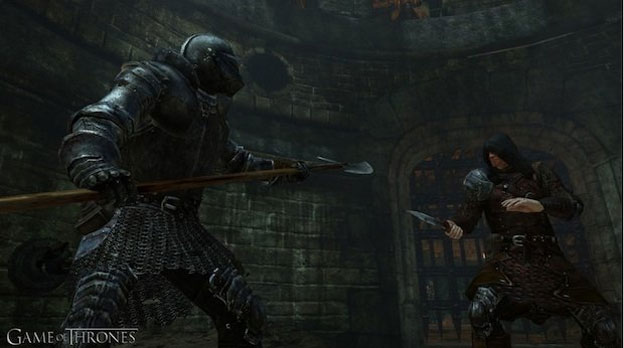
So let’s start with the story. Our tale follows Mors Westford and Alester Sarwyck. Sound familiar? They shouldn’t, because they haven’t shown up in A Song of Fire and Ice before. Instead, A Game of Thrones uses the old “side-story” gimmick, crafting a tale that runs parallel to the main plot without ever really affecting it. Mors and Alester cross paths with many iconic characters from Martin’s series, but their interactions are brief and barely have any relevance to either their own stories or the plot of A Song of Fire and Ice in general. Sure, the game has its fair share of interesting plot twists, but at the end of the day you really don’t care about what happens to these two fan-fiction-caliber characters, because you know it will have no bearing on the events of the show or the books. In fact, it feels like the appearance of characters from the main storyline are little more than name drops, made to evoke a sense of familiarity from the fandom in the hopes that this alone will carry the game. Unfortunately, it doesn’t.
It’s pretty clear that developer Cyanide wanted the game to look like the HBO series in order to draw in fans that have never read the books. Unfortunately, they fail in this endeavor. Yes, the models are based on the HBO character designs, but the characters themselves barely look like their real-life counter parts. Models are stiff and blocky, textures are blurry, and movements are robotic and unnatural. Character faces barely show any sort of emotion—at least no believable one. NPCs frequently re-use the same models in blatantly obvious ways, making the game feel like it came from the SNES days of sprite recolors. Even battle animations get repetitive and dull, especially when viewing the same cinematic kill sequences over and over again. Blatantly put, the game looks like a PS2 generation title, and not a particularly good one at that. The few scenes that shine are not worth looking at the incredibly generic visuals the rest of the game has.
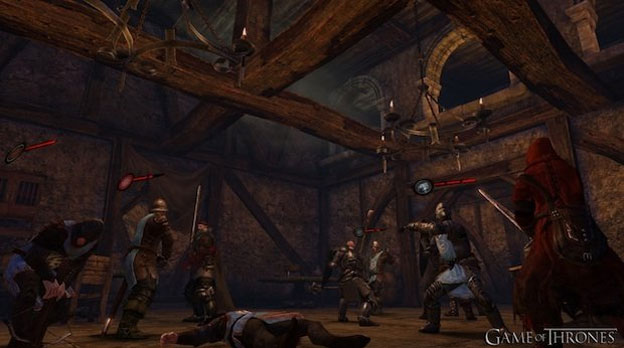
This lack of polish leaks into the game’s sound design as well. The voice performances are dry and awkward, even when given from the cast of the HBO series. The performances of lesser characters feel downright phoned in.
Additionally, there are a number of sound glitches that plague the game. Music and sound effects will randomly drop out at points, and the music itself can sometimes randomly loop back to the beginning of the game as if someone caused a record to skip. These glitches aren’t rare, they are very prominent, most often creeping up in important story scenes and taking you out of the action. In fact, the only good part about the sound design is the soundtrack lifted straight from the HBO series. The music was good there, and it’s good here when it’s not glitching and sputtering out.
Sound and music aren’t the only places you’ll find bugs either. The whole game is riddled with glitches that continuously interrupt the flow of gameplay. Aside from the numerous clipping errors that frequently got me stuck in walls—and one time horrifically merged me and an enemy into a horrific bundle of flesh and limbs that looked like it came out of a horror movie—there were times when I played myself into a corner, failing a mission and being unable to restart. In fact, the amount of times I had to reset the game was so high that I never actually finished the game. Not only is the game itself boring, but having to go over parts I’d already completed due to game glitches was the last nail in the coffin.
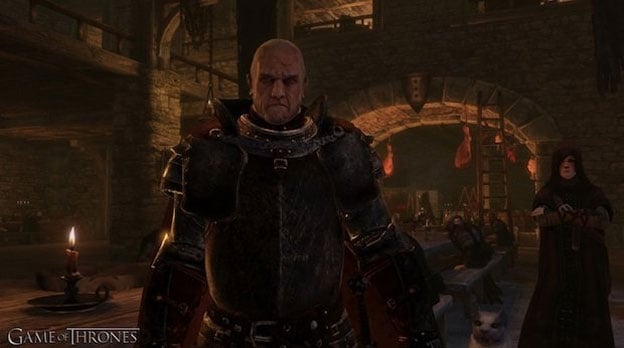
The actual battle gameplay in Game of Thrones is a great idea, but is executed rather poorly. While in battle, enemies and allies will attack each other at a steady pace automatically. However, at any time you can choose to slow down time using the “active pause” system. While this doesn’t stop the action outright, it does slow the action down to a crawl giving you time to make decisions, give your allies orders, and use special abilities. This keeps the tension in the battle high, as you never truly get a chance to rest from the action, while still giving you time to fight strategically. It’s almost like Xenoblade’s battle system, if it had a slow-down-time button.
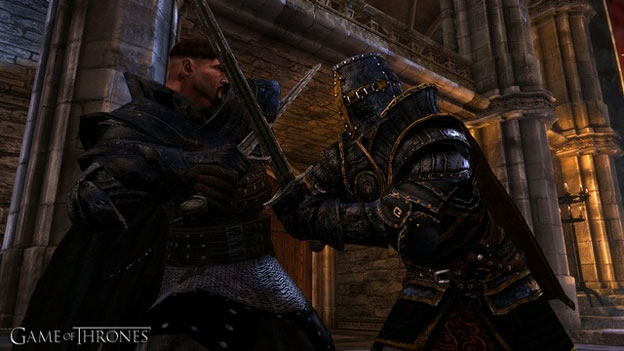
Unfortunately, the battle system falls apart when you get down to the game’s internal balance. Though the game allows you to multi-class your characters, allowing you to choose between several different skills and abilities, only a few are ever needed to get by even the biggest of battles. Combat very quickly boils down to simple flow charting strategies that rarely change. In this respect, I’d say that combat in A Game of Thrones feels more like combat in an MMO than a traditional RPG. There is a set of things you should be doing at any given point and time and as long as you stick to that pattern and keep your health high, you should be fine. It’s workable, but boring.
In fact, that’s the one word I would use to describe this game as a whole: boring. Everything about the game seems to be crafted in such a way to make the experience as un-engaging as possible. The graphics: poor. The voice acting: dry. The combat: repetitive. The story: uninteresting. In fact, the only thing this game has going for it is the Game of Thrones IP it is attached to, which is par for the course for licensed games. Frankly, there just isn’t enough content here to satisfy even the most hardcore fan of the series. It’s a shame, because A Game of Thrones truly has the potential to become an amazing console RPG. This just isn’t it.
RATING OUT OF 5 RATING DESCRIPTION 1.8 Graphics
The graphics are astoundingly poor. They shine at times but mostly are generic, bland, and dated. 2.2 Control
The controls aren’t bad, but they certainly don’t make the game very fun to play. 1.6 Music / Sound FX / Voice Acting
The music is good when it’s not skipping like a broken record. 1.7 Play Value
The game is a chore to get through once, and there’s barely any replay value—not that you would want to ever replay it. 1.9 Overall Rating – Avoid
Not an average. See Rating legend below for a final score breakdown.
| Review Rating Legend | |||
|---|---|---|---|
| 0.1 – 1.9 = Avoid | 2.5 – 2.9 = Average | 3.5 – 3.9 = Good | 4.5 – 4.9 = Must Buy |
| 2.0 – 2.4 = Poor | 3.0 – 3.4 = Fair | 4.0 – 4.4 = Great | 5.0 = The Best |
Game Features:
